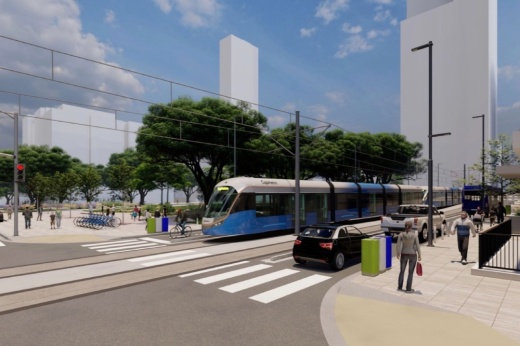The details
As proposed, the outline for the Project Connect system's first phase—which local officials could sign off on in June—features 15 stations along nearly 10 miles of track.
Rail lines would run north on Guadalupe Street to 38th Street, south along Congress Avenue to Oltorf Street and east along Riverside Drive to Yellow Jacket Drive near Hwy. 71. The plan features a few downtown stations and a new crossing of Lady Bird Lake between Trinity Street on the north shore and the South Central Waterfront.
Officials with the Austin Transit Partnership, the public agency handling the rollout of Project Connect, said the initial rail plan would draw about 28,500 riders every day. ATP officials said it would take about 23 minutes to travel from 38th Street to Oltorf Street and about 31 minutes to go from 38th Street to the Yellow Jacket Lane station.
Several of the new stations would link with MetroBus and MetroRapid routes. The downtown station near the Austin Convention Center would also connect with Capital Metro's existing MetroRail Red Line and the proposed Project Connect Green Line that would run to Northeast Austin and Travis County.
Project Connect's rail lines could be extended further along the initial routes after the completion of the initial Phase 1 plan, according to ATP officials.
Two "priority extension" routes highlighted by the ATP include a connection to Austin-Bergstrom International Airport with a new station there as well as three additional stations up Guadalupe Street connecting 38th Street to the Crestview Station area and the Red Line.
Looking further ahead, additional extensions floated by ATP officials include a link from Crestview to the North Lamar Transit Center station off US 183 to the north and three more southern stations along Congress Avenue connecting Oltorf Street to Stassney Lane.
The system's price tag is estimated at $4.5 billion-$4.8 billion and is to be funded by both local tax collections and federal dollars the ATP hopes to secure.
The big picture
The finalized proposal for Project Connect's first phase follows an extensive recalibration and public review of the city's first-ever light rail system. The ATP's recommendation is subject to a final vote by the ATP, Austin City Council and CapMetro officials.
Voters approved a tax increase in 2020 to fund Project Connect's planning, development and operations. Soaring costs eventually led transit planners to consider scaling back the full rail outline presented several years ago, and this spring they asked the Austin community to weigh in on five potential options for Project Connect's first phase.
Six weeks of public engagement yielded thousands of comments on each of those plans and Austinites' overall desires for Project Connect. ATP officials said that feedback informed the final recommendation produced May 23.
Legal review
Project Connect has drawn scrutiny this spring from multiple state officials over its financing as rail planning proceeded locally.
So far, Project Connect has been funded entirely with city tax collections starting after the 2020 election. Voters agreed to send a portion of property tax collections to Project Connect indefinitely, and those funds would end up supporting debt the ATP plans to take on to build the light rail network.
That unique financing plan was formally questioned this spring by state Sen. Paul Bettencourt, R-Houston, who requested a state legal review of Austin's election and the ATP's creation. Attorney General Ken Paxton on May 20 issued a response to Bettencourt in which he said the arrangement is likely flawed and does not align with state law.
Paxton's opinion is not legally binding, but local officials said they will take his findings into account as they work to hash out any potential issues with the details of Project Connect moving forward.
"ATP has always recognized there are many steps ahead in our financing process, and we will follow state law and take this opinion into consideration as we advance our financing," ATP Executive Director Greg Canally said in a statement.
Additionally, a bill from state Rep. Ellen Troxclair, R-Austin, would require the ATP to go back out for voter approval before issuing any bonds backed by the Project Connect tax.
While calling it a "bad bill," Mayor Kirk Watson has said he hopes an election can be held this November, if that legislation passes, to resolve the issue and allow Project Connect to move forward.
"The stakes are incredibly high because the election will determine whether light rail will proceed. And the folks who opposed our election in 2020 will get another chance to kill it—trust me, they won’t squander this opportunity," Watson said in an April newsletter. "This approach is not without risk, but it is the best option to mitigate our long-term risk."






